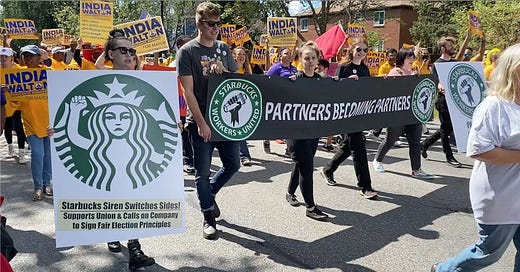Not Listening: Starbucks, Foreign Policy, And Unions
Applying the 'logic of consequence' instead of the 'logic of appropriateness'.
Tanner Greer dissects the options of Western powers and Ukraine in the war with Russia in Realism Must Guide Our Reaction to Russia’s Invasion.
First, Greer echoes Daniel Kahneman’s views on decision making:
Failure to slow down and examine the assumptions and motivations behind our choices may lead to decisions that feel right in the moment but fail to safeguard our interests, secure our values or reduce the human toll of war in the long run.
I will be using his observations about foreign policy and transposing them into the current and specific business context of Starbucks warring with workers that seek to unionize. I believe the parallelism is apt, although the stakes are not of the scale as the conflict in Ukraine: has Starbucks adopted to follow a course that ‘feels right in the moment’ but which will ultimately fail to secure the interests of Starbucks stakeholders as a whole?
Greer offers a great way to examine the two situations, channeling the political scientist Michael Mazar, whose book, Leap of Faith: Hubris, Negligence, and America’s Greatest Foreign Policy Tragedy, is ‘an exhaustive study of the decision-making process behind the invasion of Iraq’:
Dr. Mazarr contrasts two modes of foreign policy decision making: The first follows what he calls a “logic of consequences.” Policymaking in this mode is concerned with the ultimate outcomes of a proposed policy; it is obsessed with managing the costs and benefits needed to secure its goal. The second approach, “the logic of appropriateness,” is driven instead by the moral imperative to do the right thing.
Keep reading with a 7-day free trial
Subscribe to Work Futures to keep reading this post and get 7 days of free access to the full post archives.



